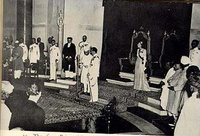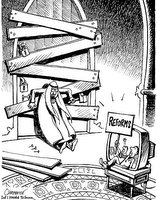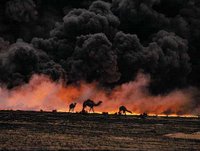
There are reports around that the coalition may have found an 'Arab' solution to one aspect of the situation in Iraq. The reports, and grumblings, are circulating in Baghdad, in some Arab media, and the Internet. This new solution is aimed at assuaging Sunni concerns and meeting some of their political demands. It also might satisfy some of the demands of the rulers of neighboring Arab oil states. This solution allegedly taking shape now would deal with the main concerns of the (Sunni) rulers of Iraq's Arab neighbors, who were always happy with a militarized Iraq where the Sunni elites controlled the officers' corp- so long as its energies and guns were aimed at internal dissent and not toward the southern and western borders.
The reports talk of a new force composed mostly of former members of Saddam's elite security and military forces, what an Iraqi official called a Third Army not responsible to the elected political leadership. Will this new force be along the lines of what is called the National Guard in neighboring Arab states, whereby the goal is to act as a balancing force to the normal military and security services?
Was the battle at the Husainiya in Baghdad last week a trial of this new policy? Will we see more of this in the coming weeks? Will this lead to an explosion and a new insurgency in the Shi'a Central and Southern regions which have been relatively calm so far?
Is the U.S creating a new Iraqi military military, or one along the same lines as the old one, i.e. the military that existed from 1921- 2003? That military was heavily politicized, it was the strongest institution in the country, and it always sought to control the political agenda. It staged coups whenever given the opportunity, and was involved in ethnic massacres (read about the Anfal operations which were completely ignored by the Arab media at the time).
Are we perhaps preparing a shadow junta a la Lon Nol or Thieu and their colleagues to balance the democratically elected body politic of a free Iraq?? Are we repeating the eighty-year old mistakes of the British? The Brits saw the Shi'a majority as the main source of potential trouble, and they thought they would eliminate the political effects of their numerical superiority by bestowing all the advantages on the Ottoman-favored Sunni elites. That policy backfired quickly, as the militarized new ruling elites almost immdeiately sought to get rid of British influence and sided with the Nazis (the April Fools coup of 1941). After a series of coups, the crowning achievemnt of that power structure was the coming to power of the Ba'ath Party (and Saddam) in 1968 and the installation of a regime that was a half-baked third-world tribal version of the Third Reich (of course without the autobahn or the proverbial trains running on time).
The rest is history...Are we about to repeat it? Would that be a good exit strategy? Would it be a good long-term strategy beyond our present election cycle of 2006-2008?
Or are we trying to set up a Turkish-style system whereby the military sets an (opaque) glass ceiling beyond which elected leaders cannot aspire to move?? Do we have our fingers crossed that this new military will not turn around as soon as we disengage and stage the first coup of the new democratic era??
These are all interesting alternatives, and one of them will probably start taking shape in the coming weeks. The next few weeks will tell.
Cheers
Mohammed








